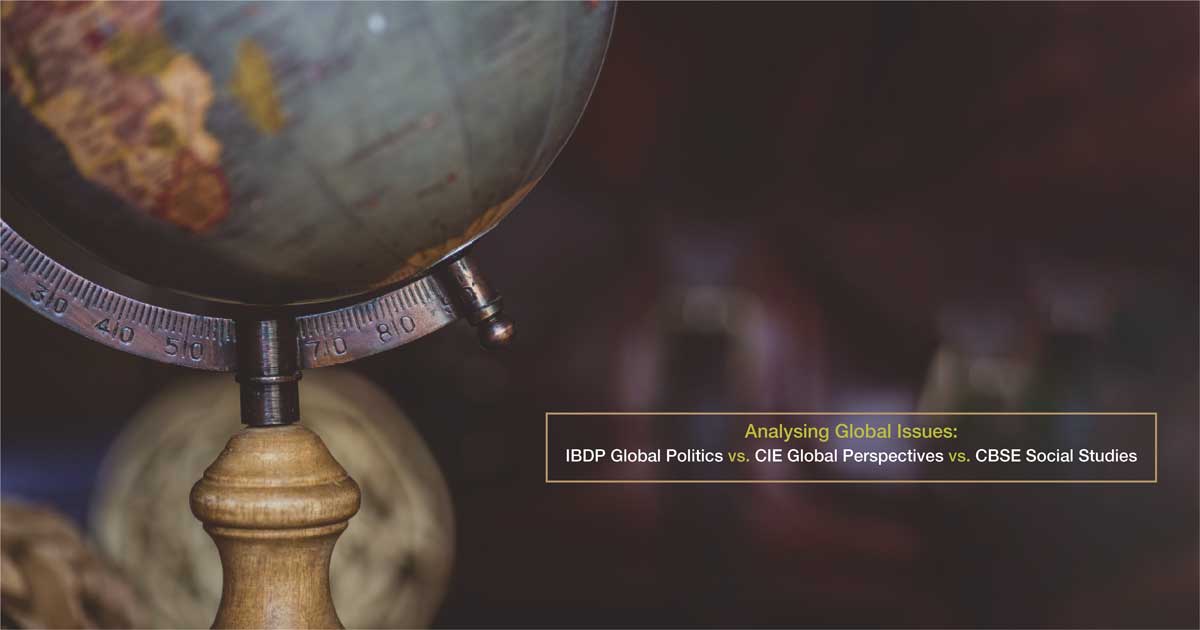

Educating school-going children on social, economic, and political issues across the globe plays a pivotal role in shaping a responsible citizen and in the collective progress of the world. Subjects like global politics, global perspectives and social studies educate students from a younger age about the rising consequences and issues disturbing the world's functioning. Exposure to detailed information and subject knowledge helps students to make ethical decisions and lead a life promoting sustainability, communal hormonal and natural health.
Different educational boards have taken advanced steps to curate subjects that educate children globally relevant social issues and let us have a detailed look at it.
International Baccalaureate’s global politics programme educates students on the fundamental concepts of politics like power, equality, sustainability, global peace and more. These subjects intend to create awareness among students about international relations, world politics, the functioning of the UN and more.
The core units of global politics in IBDP curriculum are as follows:
Additionally, the assessments and projects encourage students to complement their experiential learning with theoretical knowledge.
The subject of global perspectives put forth by the CIE board marks an iconic difference through their interdisciplinary approach to world politics and social perspectives. The CIE global perspective syllabus encourages students to explore and work collaboratively on various global issues by applying their theoretical knowledge. The course structure promotes in promoting and shapes the analytical and research skills of students on a broader spectrum.
CIE’s global perspectives revolve around the following topics in detail:
With the active inclusion of group projects, examinations and presentations, CIE boards extensively educate the school-going population on global issues and their impact on the world. Regular project reports and examinations further keep the students in check on their academic progress.
The Central Board of Secondary Education encompasses a multi-disciplinary approach towards global issues collectively tagged under the subject of Social Studies.
The syllabus not only covers the economic and political aspects, but the curriculum adopts an elaborate course structure.
The social studies subject is divided into four major parts and they are as follows:
These subjects cover a wide range of topics ranging from historical facts to the composition of soil, formation of political parties to economic progress and more. The agenda of the CBSE educational boards is to mould responsible citizens with a good understanding of factual knowledge and contemporary issues and challenges.
CBSE practices continuous assessment strategies with half-yearly examinations numerous projects and experimental learning. Thereby helping students understand the concerns vividly and act proactively.
The choice between IBDP Global Politics, CIE Global Perspectives and CBSE Social Studies completely revolves around the student preferences and desirable depth of exploration in the field. Though these educational boards differ in terms of prescribed subject depth, the curricula aim at making students aware of the social, economic, geographical and political conditions of the world at an extensive level.
IB educational board educates students extensively on political systems, international relations and systems. On the contrary, CIE puts forth an approach that gives students the freedom to explore numerous perspectives and research on the significant impact. Lastly, we see that CBSE focuses on a comprehensive understanding of the world and functioning through a multi-disciplinary approach. Although IBDP, CIE and CBSE follow different approaches to global studies, the respective curriculum offers the necessary values and perspective for critically engaging with complex global perspectives.
Recent Blogs
IGCSE Full Form
What is the International Baccalaureate?
IBDP Full Form
CIE Board Full Form
CBSE Full Form
Site Designed and Maintained By : Office of Communications, JAIN Group All rights reserved.